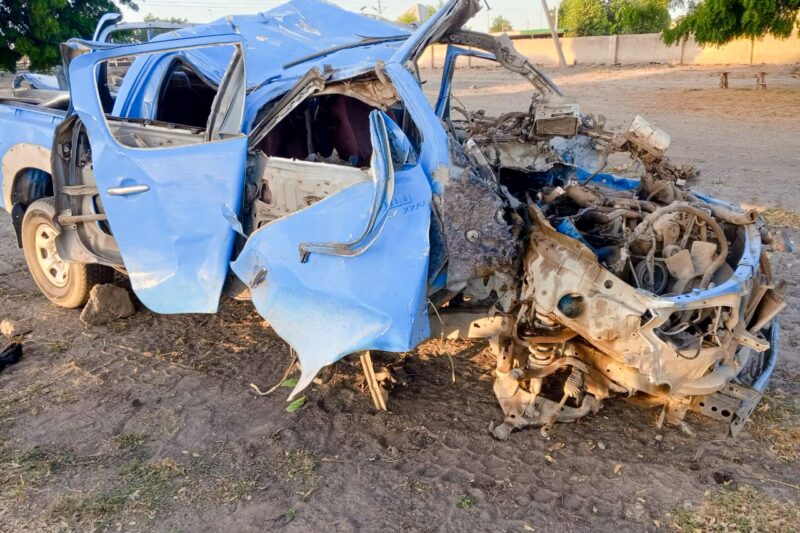Parents in the Damboa Local Government Area of Borno State say their children are already showing signs of improvement since a four-day seasonal chemopreventive malaria control (SCMC) campaign was launched on Friday, July 15.
“We officially kickstarted the campaign at the palace of the district head of the Damboa local council. Our trained community health workers went all over Damboa, going from house to house to give medication to residents,” Alhaji Kolo, a doctor who works for the council, told RNI, adding that the campaign was particularly important in the wet season when there was plenty of stale and stagnant water for parasitic mosquitoes to breed.
In Borno State, malaria was rampant and there was an urgent need for proactive measures to curb the spread of the serious and sometimes fatal disease.
Kolo said the World Health Organisation (WHO) had provided medication for the campaign. Community health workers were given special training to advise people on how and when to take the medication.
“One of the most important measures to stop malaria spreading is to hold awareness events, informing residents about the effects and dangers of the disease,” he said.
“We advise residents to ensure their environment is kept hygienic and safe. Garbage along the waterways should be cleared. And we have told them to stop dumping rubbish into drainage systems, which get blocked and are the perfect breeding grounds for mosquitoes.
“We also urge parents, especially pregnant and breastfeeding mothers, to use mosquito nets at night, so that they will be protected against mosquito bites.”
Kolo said the council’s trained community health workers had distributed the medication from the WHO free of charge to residents as part of campaign.
The WHO said that when given to young children and pregnant women, who were most vulnerable to malaria, preventive chemotherapy had been shown to be a safe, effective and cost-effective strategy for reducing the disease burden and saving lives.
They health workers had given parents two kinds of medication. The first was solely for children who were three to 11 months old and the second for children from one to five years old.
Adamu Garba Alooma, the council chairman, had approved the campaign and said ward councillors and traditional leaders had shown support and fully cooperated.
Kolo said they were determined to eradicate malaria or, at the very least, stop the rampant spread or it.
“We have mosquito nets donated to us by the WHO and, God willing, we will soon start distributing them, especially for pregnant and breastfeeding mothers, so that they can be protected against mosquito bites.
“During the campaign we informed, educated and enlightened parents, especially mothers, on how they should use the medicines to avoid drug abuse and negligence in handling them. For example, we clearly explained that they should use the medication for three days. The white and one yellow pill should be given to the children immediately and the remaining two yellow pills taken once a day on the two following days.”
Kolo said the health workers had emphasised the importance for people to use the medication as prescribed. He said the council would talk to traditional and religious leaders, as well as the media, to educate, inform and enlighten the public. It was hoped that using these means, parents, guardians and the rest of the public would take the medication without worrying or being suspicious about it.
The WHO carried out the same campaign in some areas within Maiduguri, the capital of Borno State, also providing medication for children five years and younger.
Falmata Modu, a resident of Maiduguri, told RNI that she was relieved and happy to get the medication for her children.
“This antimalaria medication is especially important for us – we live in a hut with some grass and water around and we also go to the farm. There are many places where the mosquitoes can breed and that makes us highly vulnerable and prone to get the disease.”
She said the doctors had given them the drugs on Friday and she had already used them, adding that she had been given a ticket so that she could get more of the medication next month.
“My children are already feeling better.”
Bakura Goni, a doctor, told RNI that antimalaria drugs were essential, serving two purposes – preventive and treatment.
“These antimalaria drugs are so important because they can prevent and treat malaria. The drugs comprise three yellow pills and one white pill. The three yellow pills are the antimalaria drugs; the white pill is a paracetamol which helps with the high fever. The SCMC campaign is indispensable and timely because, especially during the wet season, most people living here have had malaria at least once.”
The WHO said malaria was highly seasonal, with most cases occurring over a brief period during the rainy season.
“Seasonal malaria chemoprevention (SMC) is designed to protect children by clearing existing infections and preventing malaria infections during the season of greatest risk.”
It said preventive chemotherapy was the use of medicines, either alone or in combination, to prevent malaria infection and its consequences. It required giving a full treatment course of an antimalarial medicine to vulnerable populations – generally infants, children under the age of five and pregnant women – at designated time points during the period of greatest malarial risk, regardless of whether the recipient was infected.
The health agency gave these key facts:
- Malaria is a life-threatening disease caused by parasites that are transmitted to people through the bites of infected female Anopheles mosquitoes. It is preventable and curable.
- In 2020, there were an estimated 241 million cases of malaria worldwide.
- The estimated number of malaria deaths stood at 627 000 in 2020.
- The WHO African Region carried a disproportionately high share of the global malaria burden. In 2020, the region was home to 95% of malaria cases and 96% of malaria deaths. Children under five accounted for about 80% of all malaria deaths in the region.
The agency said malaria was an acute febrile illness caused by Plasmodium parasites, which were spread to people through the bites of infected female Anopheles mosquitoes. There were five parasite species that caused malaria in humans, and two of these species – P. falciparum and P. vivax – posed the greatest threat. P. falciparum was the deadliest malaria parasite and the most prevalent on the African continent.
The first symptoms – fever, headache and chills – usually appeared 10 to 15 days after the infective mosquito bite and could be mild and difficult to recognise as malaria. Left untreated, P. falciparum malaria could progress to severe illness and death within a period of 24 hours, the WHO said.
SHETTIMA LAWAN MONGUNO








